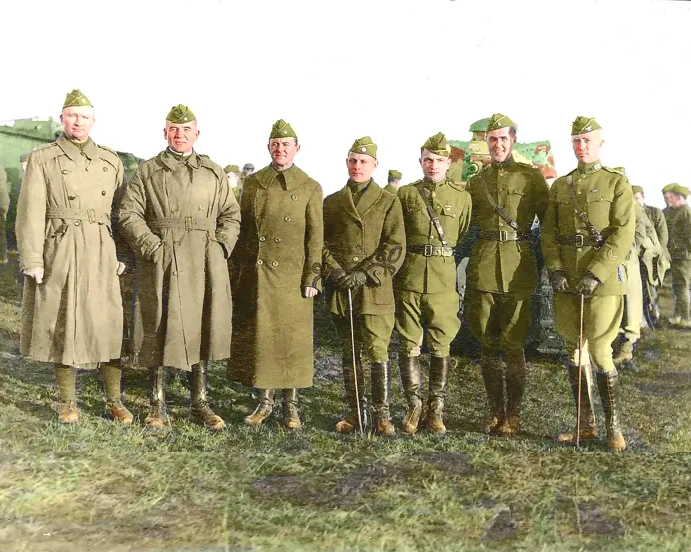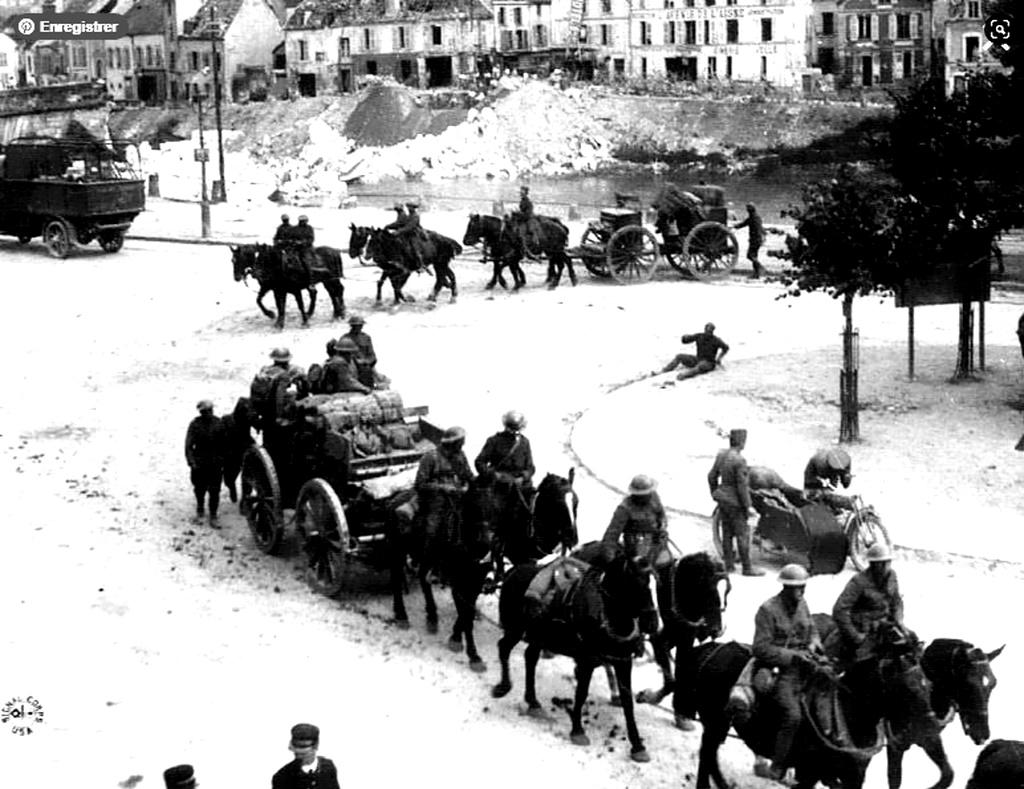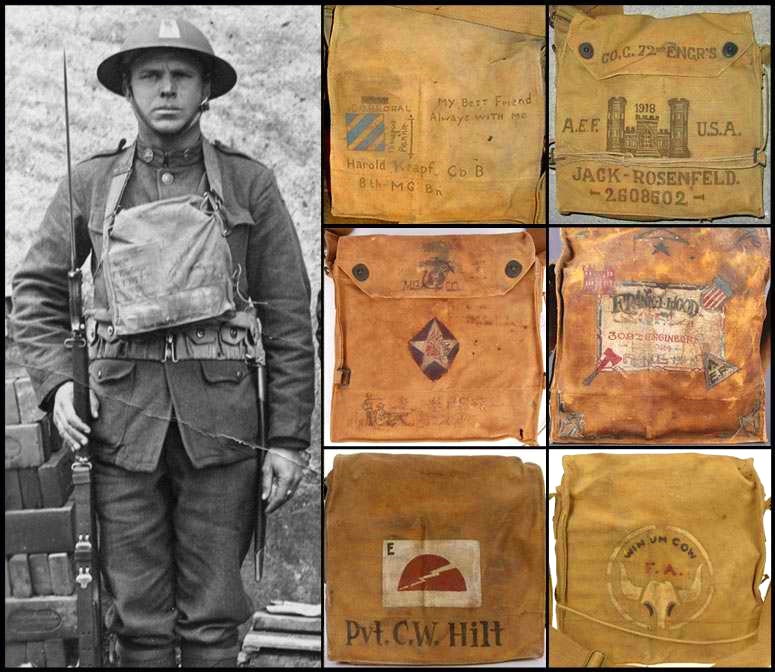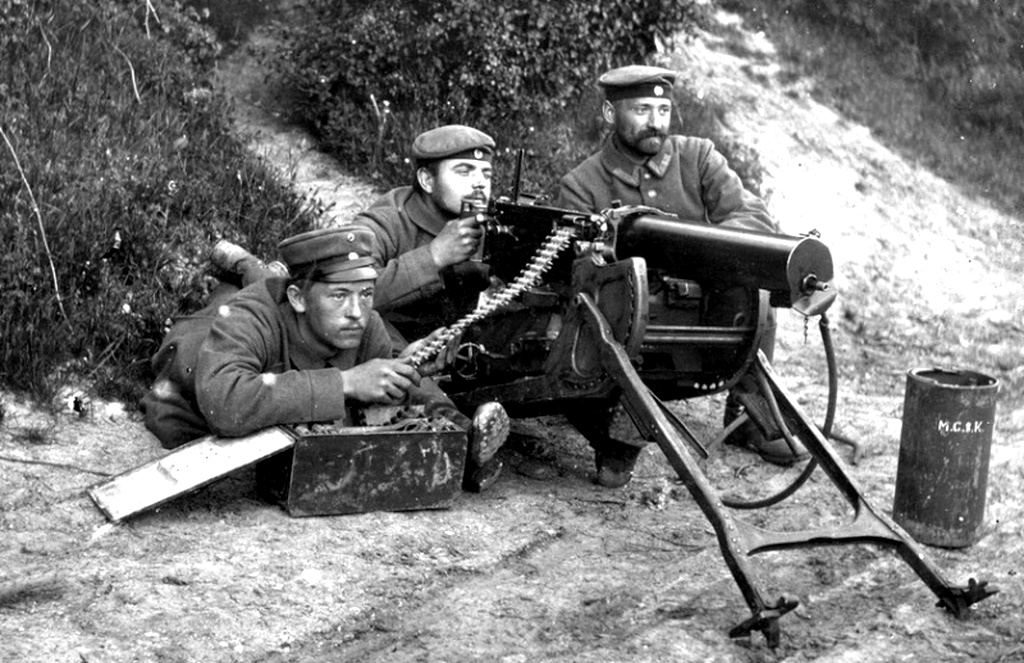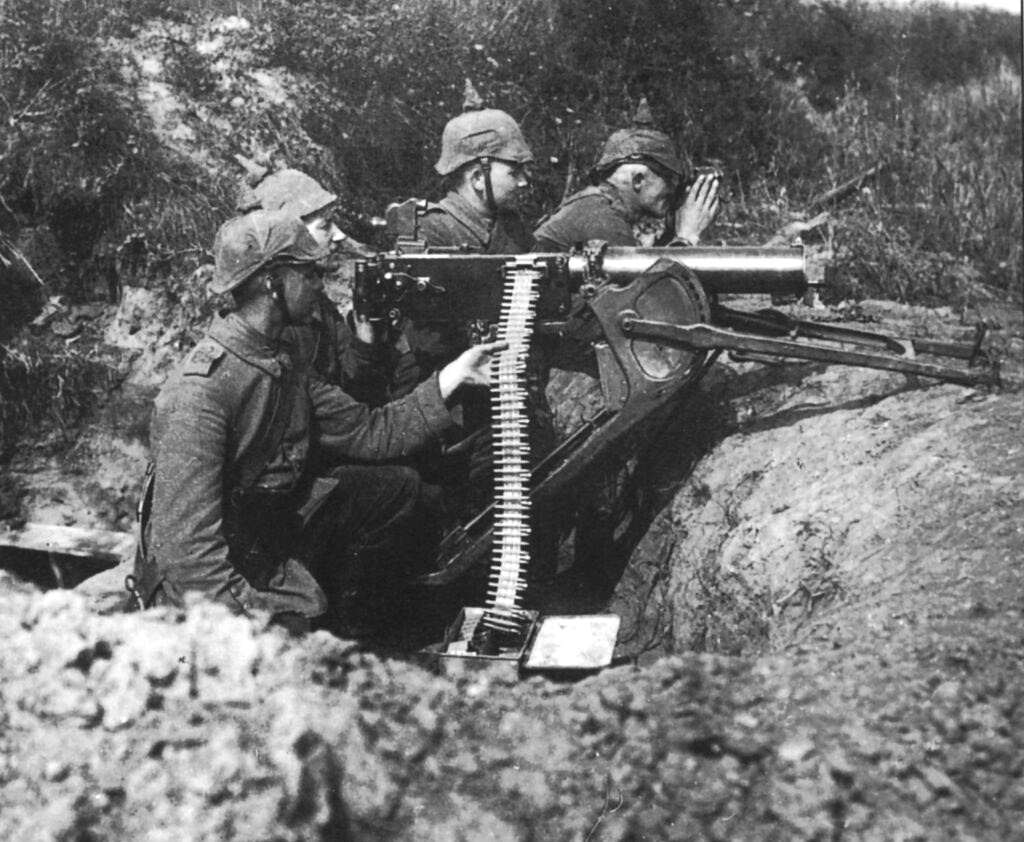(PART THREE) Document Source: Historical Research Division, Aerospace Studies Institute, Air University, Maxwell Air Force Base, Alabama. The World War One Diary of Col Frank P. Lahm, Edited by Albert F. Simpson, Historical Research Division, Transcripted by Doc Snafu (Personal views or opinions expressed or implied in this publication are not to be construed as carrying official sanction of the Department of the Air Force or the Air University. This publication has been reviewed and approved by competent personnel of the preparing command in accordance with current directives on doctrine, policy, essentiality, propriety, and quality.
 September 26 (Thursday). This is the big day. When I went home last night there was continuous and very heavy firing to the west in the 4th French Army. Our own artillery preparation started at 0230 and our men went over the top at 0530. The Boche high command must certainly have had a bad night. With an artillery preparation opening up on him over a front of about 95 miles from Reims to the Moselle, followed by an attack over a total of about 63 miles, he must have thought hell had broken loose, and he could not know where it was loosest (sic) or where to throw in his reserves. When I got up the guns were booming hard. I, then, spent the day in the office of the G-3, US First Army with Col McCleave and Col Marshall, where operations were directed.
September 26 (Thursday). This is the big day. When I went home last night there was continuous and very heavy firing to the west in the 4th French Army. Our own artillery preparation started at 0230 and our men went over the top at 0530. The Boche high command must certainly have had a bad night. With an artillery preparation opening up on him over a front of about 95 miles from Reims to the Moselle, followed by an attack over a total of about 63 miles, he must have thought hell had broken loose, and he could not know where it was loosest (sic) or where to throw in his reserves. When I got up the guns were booming hard. I, then, spent the day in the office of the G-3, US First Army with Col McCleave and Col Marshall, where operations were directed.
September 27 (Wednesday). At 0330, I have just relieved Marshall in the Operations office and am on duty the rest of the night. Yesterday was an entirely successful day. Our troops pushed forward to their Corps Objectives by about 1400, and on the right reached their Army Objectives before dark. Our casualties were tight and as at St Mihiel there was not much fighting. The hill and town of Montfaucon was the one stumbling block and it finally was taken toward evening. Prisoners are estimated at 7000, but the woods have not all been cleaned up, as was shown when some engineers of the US 4th Division, working on a road that was taken in the early morning, were fired on from a nearby woods. The ‘cleaning up’ process has not yet taken place, and these Boches do not know that they are left miles inside our line. One Boche officer prisoner said they had known for four days that we would attack and had pulled back their guns to a position he did not know. One Boche soldier said they did not even know that there were Americans opposite them. The Air Service had a successful day, bringing down some balloons and planes, an actual number not known as yet.
One expedition by our bombers against Dun-sur-Meuse, lost 5 ships, one of which blew up in the air, evidently due to one of their bombs being hit by an antiaircraft shell. Several long-distance reconnaissances were made to the east, bringing în word that there was no movement of troops from there. We had expected reserves to be sent in from that direction. The Secretary of War Baker came into the office with Gen McAndrew, CoS GHQ-AEF, and McCleave explained to them the situation. Covell is just back at 0415 from the US 5th Corps HQs where he tried to get the facts about their Divisions. One of them has lost all track of two of its regiments but thinks they have pushed ahead. I have just had my fur coat brought over as it is cold and there is no wood. Incidentally, I am wearing a fur cap too. At 0500, guns are booming, but there is little doing at the front. No reports coming in. Our French and Italian bombers went over before midnight.
September 29 (Sunday). This is the 4th day of the attack. The first day went very well – the last two days badly. The average gain yesterday along the entire front was about two kilometers. It has rained, our men have suffered a lot and no doubt are pretty well used up. No reserves are being put in, however – they are still held in the rear. The US 1st Division was moved to Blercourt the night before last and is ready to go on up. The Air Service has done very well. They have brought down a lot of Huns, and except for the first day, their losses have not been heavy. We have had several balloons burned, and lost, one of our good observers, who failed to jump in time, was overtaken by the burning balloon and dropped. (Army Air Service: American observers made at least 116 (probably 125) emergency parachute jumps, and this was the only instance in which the jumper was killed).
The US 4th Army on our left has had but little success – its advances are negligible. The French 5th Cavalry Division. was reported yesterday to have made 5 kilometers in 24 hours in its march toward the former No Man’s Land. The Belgians made a big gain yesterday, taking Passchendaele – a year ago, when I was with the 2nd British Army, they attacked on part of the same front, before Ypres, after a bombardment lasting several days, and made about 1/5 the gaïn that was made yesterday. Times have changed. The Boche has lost his holding power and has not had the reserves to stop the Allies’ advance.
I had a beautiful trip today with Mitchell in his two-place Spad 230 HP Hispano Suiza. Went across the southern end of the Argonne Forest into Champagne where the French were firing with all their artillery, both large and small – it was a great sight, just a little like the firing of the two British Armies which I saw from a balloon a year ago. Four French balloons were up. From here we crossed the Argonne Forest and sailed over the former front line trenches – a mass of barren shell holes. One of our balloons was up, and the Boche was firing continuously from the ravine running up from Consenvoye across the Meuse. The little firing was being done from our side of the line. A few planes were up – and went by us. Verdun lay in the valley.
 October 2 (Wednesday). The history of these past three days is not good to write about. Our divisions were halted by Boche machine guns, but more particularly by his artillery, losses were heavy, particularly in officers, and a couple of our divisions became completely disorganized – stragglers wandered back to here Souilly. Finally, we gave up the advance and formed a line somewhat to the rear on which to reorganize and collect the men. Two divisions have been replaced – the 1st is now în the line and when word comes to advance, it is expected that it will set the example and carry the whole line forward with it. The congestion on the roads in the rear has been terrible – it has not been possible to get them repaired in time – consequently, the men at the front have had to go hungry. In addition, they have suffered from the wet and now it has turned decidedly cold – especially at night.
October 2 (Wednesday). The history of these past three days is not good to write about. Our divisions were halted by Boche machine guns, but more particularly by his artillery, losses were heavy, particularly in officers, and a couple of our divisions became completely disorganized – stragglers wandered back to here Souilly. Finally, we gave up the advance and formed a line somewhat to the rear on which to reorganize and collect the men. Two divisions have been replaced – the 1st is now în the line and when word comes to advance, it is expected that it will set the example and carry the whole line forward with it. The congestion on the roads in the rear has been terrible – it has not been possible to get them repaired in time – consequently, the men at the front have had to go hungry. In addition, they have suffered from the wet and now it has turned decidedly cold – especially at night.
Our men suffered from hunger, cold, and exhaustion, not to mention deadly fire from the Boche. The startling news of Bulgaria‘s offer to capitulate reached us two days ago, followed yesterday by the still more startling demand made by Austria on Germany, to start the move for immediate peace. Germany may well be responsible for all this, but it shows the beginning of the end. I am ready to bet however that we will still be fighting six months from now. The Kaiser no doubt knows that he must stop this offensive soon – but he is like the man who had the bear by the tail. In the meantime, the British, Belgians and French are all pushing back the Boche. Roy Barnes was just in – he is very happy at being relieved as Adjutant General US First Army and going to command an artillery regiment.
October 3 (Thursday). Borrowed Watkins’ car and chauffeur and left at 1745 for Rarecourt where the Signal Corps gave me a basket with 4 carrier pigeons, message tubes, blanks, feed, and instructions how to handle them. From here I went north thru Clermont-en-Argonne then on across the old front-line trenches to Varennes. A traffic jam held me up for a half hour but finally reached the 1st Division CP at Cheppy, where they told me that the 1st Brigade CP (Frank Parker’s) was near Charpentry. As the roads are one way only, I had to return to Varennes, come out the Cheppy road agaîn and turn north to Charpentry. Some big tractors, hauling heavy guns held me up for some time, so I reached Charpentry at about 2200. The air was pretty strong with gas. Left the driver and car beside the road and stumbled around in the dark till I found a lighted dugout which proved to be 16th Infantry HQS – they then directed me to 18th Infantry.
By this time, heavy shell fire was falling. Found the 18th Infantry and Col Hunt, who gave me a runner to show the way to Brigade CP. On returning to the car, I found the driver lying on the road in front of the car. He said his arm was broken and that he was badly hurt. It took but a minute to get him on a stretcher and into a dressing station in a dugout only 100 feet away. A 77-MM shell had hit within 10 feet of him – he had a hole in his leg so large I could put my hand in it, the flesh was entirely gone from half of his right arm from the shoulder to the elbow, leaving the bone entirely exposed – another serious wound in the leg and any number of small pieces of shell all over him. While the doctor was working on him, the mustard gas became so strong we had to put on our masks and put one on the wounded man. At this time there was a perfect hurricane of shells falling on the town. After putting on bandages, the Dr. called an ambulance, put an urgent tag on the man, and loaded him in. Just then, word came in that there was a gas case and another man wounded by shell fire. The ambulance was held to take them too, then started for Cheppy.
I waited till the gas had decreased somewhat, then started out with my runner, holding the mouthpiece in my mouth and clips on my nose. We took them off when we got on the high ground out of town. Gas settles into low places. Finally, after stumbling across the country in the dark, we reached the mouth of the dugout at midnight – I climbed down the steps about 40 feet underground where I found a typical concrete dugout – alt the officers were stretched out on the floor in the narrow passageway. An orderly gave me a blanket and I lay down on the floor and slept off and on till 0430.
We had coffee and bacon. At 0525 the attack I came to see, opened up. We stood at the mouth of the dugout and watched it – much lîke a 4th of July celebration but noisier. There was almost no response from the Boche artillery. Our reserves came along over the hill in the dark and disappeared toward the front, a long line of columns moving silently. The Charpentry ammunition dump was hit and is cracking merrily as the ammunition explodes. As daylight came I saw 80 dead horses lying in the valley below. At 0645, it was light enough to see one of our balloons – two others came up short and two Salmsons went over, followed shortly by several others. From then on our Aîr Service was active all day, except for about half an hour at noon.
I released my first pigeon which circled around then headed due south for home. We picked up our gas masks, kit bags, pigeons, etc., and started forward. Before going one kilometer we began to find dead, both American and Boche – at the end of two kilometers we were stopped by shell fire and dropped into holes for shelter. I found a Spad monoplace, No. 24, overturned and completely smashed up in a line of barbed wire just beside me. No sign of the pilot. My only companion in my shelter was a dead mouse. 12 dead Americans in the immediate vicinity and 6 dead Boches. Boche prisoners began to pass us here, many of them carrying our wounded. Not a Boche plane in sîght. One of ours dropped a message several hundred yards in front of me. When the shelling quieted down, I went out and looked for it with the assistance of some machine gunners but did not find it.
Here are some notes written on the spot: 1030, No. 6 Salmson, white ring on the nose is circling over us and over the woods, în front of us at 50 feet, waved to him; 9 of our planes just went over. Tanks going up. Heavy machine gun fire in the woods in front and toward Apremont which is west of here; 1330, French Artillery HQs advancing rapidly to the west, a shell just burst east of them; one Salmson burned up with both men 1250 M northeast of Apremont; About 1600, Frank Parker wanted to know what was going on at the front, so with Capt Coulter and Lt Daley, I went up thru the Bois de Montrebeau (Exermont) pretty well shot up with shells, some Boche prisoners coming back, many of them carrying our wounded, ran onto Maj Emery who had a reserve battalion in the woods.
In the rear of Exermont, two wounded men were lying in shell holes, one had been there four hours with a bad hole in his back, and asked me to fix the dressing. Later, I found some stretcher-bearers and told them where to find these men. Here we became separated, but after crossing the valley I found Coulter and Daley with Lt Col Hunt, the Regimental Commander at the edge of the woods leading up onto Montrefagne, a wooded hill covered with Boche machine guns that were pop-popping at us merrily. As many as 150 men were lying in shell holes trying to dodge machine guns and rifle bullets and shells, but most of the latter were going over our heads. They evidently spotted us as officers, because one bullet clipped a twig over our heads, followed immediately by a second that kicked up the dust in the faces of three who had dropped flat. It raised a welt on one man’s arm as it went by. A Lt McNish took his company and went into the woods to storm the machine guns on the top but came out a little later, unable to make it. Capt Campbell and a couple of others are lying dead in the woods, the result of a previous attack.
A lieutenant had come up from the west side earlier in the afternoon and reported that he got on the hill and at least 200 Boches ran off toward the east. He looked around and found he had only 8 men with him, so gave it up and came down again. I found a sergeant just coming up with about a dozen men, explained to him that he could take the hill if he would approach ît from the east flank, and led him around the corner of the woods where we promptly ran into a machine gun and rifle fire. One bullet kicked up the dirt in such a direction as to indicate it came from Exermont. I believe there was a Boche sniper hanging back in the town. I pointed out to the sergeant how he was to go and sent him on. I never heard what became of him and his men. Finally, a new frontal attack was organized with additional men that had come up. A machine gun company was placed on the edge of a little wood on our left and started to reply to the Boche’s machine guns.
Finally, it was getting dark and we wanted to take back our report, so held a council of war – at the end of which it was decided to organize a line of resistance in shell holes a hundred yards from the woods, leaving patrols in the woods. We left about dusk. I saw some sîdes of the soldier’s game in those two hours that I shall never forget. For the colonel, it was just a hard job to be performed – to most of the officers it was the same – some of the men were a little timid, but most of them simply needed to be led – and there is the important point. We must have leaders, from sergeants up, and all good ones. At one time, two Boche planes flew over us not more than 300 feet up, over and over. For some reason, they did not seem to see us. One fired his very pistol and drew Boche artillery fire on the hill to the east of us. I could see no one on it.
Then he did the same on the west of us, and again, the Boches shelled it. Boche pursuit planes were circling around at a high altitude. We were almost ready to get down and pray for an American plane, and like the Campbells at Lucknow, it came. A Salmson just about the same height as the Boche observation plane. In a second they spotted the latter, attacked him, and drove him back over his own lines, ours following until both disappeared in the mist. Soon afterward, ours returned and circled over us. I waved my white handkerchief to show him where we were and got the other officers to do the same. He must have seen us. Then he circled over the woods – I don’t know whether our men showed their panels or not. About this time our pursuit showed up and shortly I counted 29 planes in the air, Boche and American, circling, diving, attacking – separating, climbing, and attacking again.
Strange to say not one was brought down. We had to keep a careful course on the way back, shells were covering the hill behind us. We found one section where there seemed to be fewer of them and went thru there. Passed Chaplain King on the way back. He had been burying the dead all day. We finally reached the 1st Brigade CP long after dark and were so tired we could hardly walk. The Command Post was in a much better concrete dugout near where we had stopped in the morning. Some good hot soup and beans and potatoes tasted very good. I had no blanket but my heavy coat was enough, especially as I had a bunk with some hay on it – left there by the Boche. Tried to phone the First Army HQs but could not make myself understood.
